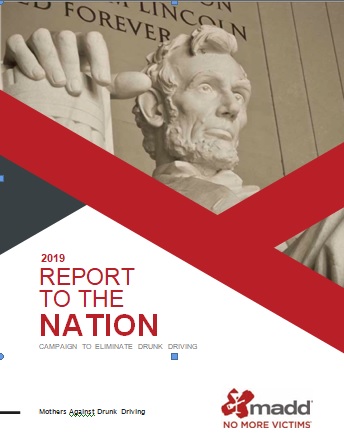Mothers Against Drunk Driving (MADD) released its 2019 Report to the Nation on December 23, 2019. All 50 states and the District of Columbia were rated in five categories:
- Ignition interlocks for all drunk-driving offenders
- Conducting sobriety checkpoints
- Administratively revoking driving privileges upon arrest for drunk driving
- Creating enhanced penalties for those who drive drunk with a child in the vehicle
- Adopting penalties and expediting warrants for suspected drunk drivers who refuse an alcohol test
 MADD National President Helen Witty said, “The report, the sixth since the launch of our Campaign to Eliminate Drunk Driving in 2006, serves as a guide for supporters, state and federal lawmakers, traffic safety partners and a roadmap to those who wish to help MADD reach its ultimate goal of No More Victims. For every person killed or injured by drunk driving, countless other lives are changed forever. We call on these states and others to pass laws proven to reduce these tragedies. We also know that technology has the potential to eliminate drunk driving in America. That is why this year MADD supported federal legislation introduced in the House and Senate that would require passive, alcohol detection technology in all new vehicles.”
MADD National President Helen Witty said, “The report, the sixth since the launch of our Campaign to Eliminate Drunk Driving in 2006, serves as a guide for supporters, state and federal lawmakers, traffic safety partners and a roadmap to those who wish to help MADD reach its ultimate goal of No More Victims. For every person killed or injured by drunk driving, countless other lives are changed forever. We call on these states and others to pass laws proven to reduce these tragedies. We also know that technology has the potential to eliminate drunk driving in America. That is why this year MADD supported federal legislation introduced in the House and Senate that would require passive, alcohol detection technology in all new vehicles.”
The MADD 2019 Report said Florida has an ignition interlock requirement for all first-time convicted drunk drivers of a blood alcohol content (BAC) of 0.15 since 2008. Here are MADD’s recommendations for added measures Florida should consider taking:
- Pass an all-offender ignition interlock law
- Enact a law making child endangerment a
felony
- Pass a law requiring ignition interlocks or
criminalizing refusal to submit to an alcohol
test
Ignition Interlocks
MADD believes that starting with the first arrest or conviction of DUI, every drunk driver should use an ignition interlock for at least six months. Also, the only option for driving after a drunk-driving offense should be with the device installed.
Child Endangerment
MADD believes drunk driving with a child passenger is a form of child abuse and should have additional penalties.
Refusal
MADD says about 20 percent of suspected drunk drivers refuse sobriety tests. When this happens, MADD believes it should be considered the same as a failed sobriety test. Warrants need to be expedited so law enforcement agents can collect evidence to help prosecute drunk drivers.
2019 statistics for the first 6 months showed:
- 1 percent of responders aged 35 to 44 know someone who has been killed in a drunk-driving accident.
- 6 percent of female respondents aged 18 to 24 admitted to driving while buzzed.
- 4 percent of college-age respondents believed they were fit to drive after 3 or 4 drinks.
“If you or a loved one has been injured because of the negligence of a drunk and/or drugged driver, please contact Spivey Law Firm, Personal Injury Attorneys, P.A. Our firm represents people involved in numerous types of personal injury and wrongful death accidents throughout the state of Florida. All of our clients have unique personal injury cases. Our previous clients have taken the time to compliment us on our communications, responsiveness, quality of service, and value for which we have been awarded the Client Distinction Award from Martindale-Hubbell,” said Fort Myers DUI Accident Attorney Randall Spivey.
Fort Myers DUI Accident Attorney Randall L. Spivey is a Board Certified Trial Attorney – the highest recognition for competence bestowed by the Florida Bar and a distinction earned by just one percent (1%) of Florida attorneys. He has handled over 2,000 personal injury and wrongful death cases throughout Florida. For a free and confidential consultation to discuss your legal rights, contact Spivey Law Firm, Personal Injury Attorneys, P.A., in Lee County at 239.337.7483 or toll-free at 1.888.477.4839, or by email to Randall@SpiveyLaw.com. Visit SpiveyLaw.com for more information. You can contact Spivey Law Firm, Personal Injury Attorneys, P.A.in Charlotte County at 941.764.7748 and in Collier County at 239.793.7748.


